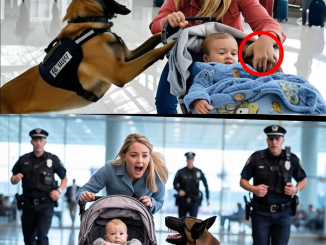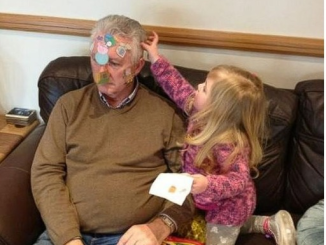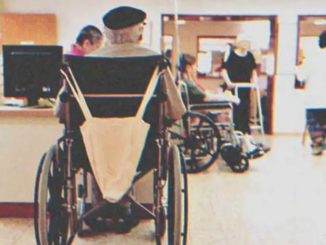
He had it all: a faithful wife, five children who adored him, a house that looked like a palace.
But one night, blinded by pride and money, Don Ernesto Villarreal threw them out like garbage.
Years later, he would return, dragging himself along, penniless, friendless, and without the respect he once thought he deserved.
And then he would discover that what he had destroyed with arrogance, his wife had rebuilt with dignity.
That night, the echo of his own voice would haunt him for years.
“I never want to see you in this house again.”
Magdalena didn’t answer.
She didn’t scream, she didn’t beg.
She knew that words would no longer reach him.
She took the children, left without looking back, and the slam of the door sealed the end of a marriage and a life.
For months, Ernesto continued living as if nothing had happened.
He hosted dinners with business partners, traveled in luxury cars, and toasted his “successes.” But his company, Construcciones Villarreal, began to crumble when his ambition led him to sign shady contracts.
When the scandals broke in the press, his partners abandoned him one by one.
The accounts were frozen.
The mansion was seized.
And the last glass he raised, he drank alone.
Meanwhile, Magdalena faced her own personal hell.
With five young children and no money, she spent entire nights without sleep.
The first few days they slept in her mother’s old, abandoned house.
The roof leaked, the floor was covered in dust, but at least it was a place to cry without witnesses.
Camila, the eldest, started helping out by selling sweet bread at school.
Luisito cleaned windshields.
Magdalena sewed other people’s clothes until dawn.
They didn’t complain.
They didn’t blame anyone.
They simply learned to survive.
Sometimes, when hunger gnawed at them and the children asked if their father would return, Magdalena would only answer:
Ten years later, in Guadalajara, a name many thought buried was heard again: Ernesto Villarreal.
He returned with gray hair, a vacant stare, and a suitcase containing barely a couple of shirts. He had worked as a laborer in the north, after losing everything to lawsuits and debts.
He had fallen ill, and now, weary, he returned searching for the only thing he had ever had and destroyed: his family.
He walked to the neighborhood where his mansion had once stood.
In its place, only ruins and weeds remained.
He asked for Magdalena. A fruit vendor answered:
“Ah, Doña Magda… she lives up there on the hill, near the community center.”
“Community center?” Ernesto asked.
“Yes, the one she founded herself. She teaches women to sew, to read, and to start small businesses.” She’s an admirable woman.
Ernesto felt a lump in his throat.
Her? The woman he had so ruthlessly thrown out… now helping others get back on their feet?
He climbed the hill slowly.
His heart pounded, more from fear than exhaustion.
When he arrived, he saw a modest but clean building with a hand-painted sign:
“Casa Luz — Workshops and Hope”
Outside, some women laughed as they embroidered.
And in the center of them, wearing a simple dress and a serene smile, stood Magdalena.
Ernesto stood still.
Ten years had passed, but she still had the same steady gaze, the same calmness he had never understood.
She was the first to recognize him.
Her smile faded, but there was no hatred in her eyes.
Only a quiet sadness.
“Ernesto,” she said, without surprise. “I thought I would never see you again.”
He lowered his head.
“Magdalena… I… I don’t know where to begin.”
The murmurs around him died away.
The women watched him, unsure whether they should leave.
“I came to ask for your forgiveness,” he said. “I lost everything. The house, the company… even my health. I was a fool.”
She listened without interrupting.
When he finished, he was silent for a few seconds.
“I didn’t come to hurt you, Magda. I just wanted to see you, even if it’s for the last time.”
Then she offered him a chair.
“Sit down, Ernesto. I don’t hold a grudge. But life went on… and changed more than you can imagine.”
That night, Ernesto was invited to dinner.
The table was full of faces he barely remembered.
Camila, now 22, was a teacher.
Luis worked for a solar energy company.
Mateo was studying engineering. Ana Lucía was about to graduate as a nurse.
And little Tomás, the one who had once cried in his mother’s arms, was playing guitar in a youth group.
“Dad…” he said shyly, “Mom told us what happened.”
Ernesto couldn’t look them in the eye. The pain of seeing them so grown up and so far away broke his heart.
“I know I don’t have the right to call you children,” he said through tears. “But I want you to know that I’m sorry.”
Camila was the first to speak.
“We don’t need you to ask for forgiveness, Dad. Mom taught us to forgive a long time ago.”
That sentence devastated him.
Not out of pity, but because of the lesson it held: forgiveness isn’t always asked for, sometimes it’s given silently.
Ernesto spent the following weeks helping out at the community center. He swept, carried boxes, repaired chairs.
Not as penance, but as an attempt to feel useful






Leave a Reply